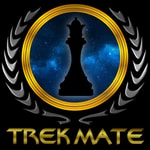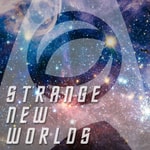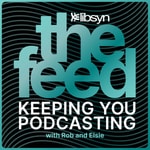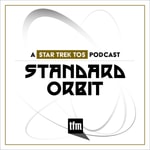Meta Treks: A Star Trek Philosophy Podcast – Details, episodes & analysis
Podcast details
Technical and general information from the podcast's RSS feed.
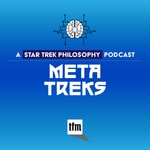
Meta Treks: A Star Trek Philosophy Podcast
Trek.fm
Frequency: 1 episode/18d. Total Eps: 98

Recent rankings
Latest chart positions across Apple Podcasts and Spotify rankings.
Apple Podcasts
🇬🇧 Great Britain - philosophy
29/04/2025#89🇬🇧 Great Britain - philosophy
03/02/2025#91🇨🇦 Canada - philosophy
28/01/2025#80
Spotify
No recent rankings available
Shared links between episodes and podcasts
Links found in episode descriptions and other podcasts that share them.
See all- http://itunes.com/trekfm
354 shares
- http://www.speakpipe.com/trekfm
302 shares
- http://www.trek.fm/contact
300 shares
- http://facebook.com/trekfm
302 shares
- http://facebook.com/trekfm%C2%A0
61 shares
- http://patreon.com/trekfm
361 shares
RSS feed quality and score
Technical evaluation of the podcast's RSS feed quality and structure.
See allScore global : 42%
Publication history
Monthly episode publishing history over the past years.
98: Geordi's Pedagogically Esoteric PowerPoint Presentations
Episode 98
lundi 17 août 2020 • Duration 01:36:39
Gnosticism, Esotericism, and Secrecy in Star Trek.
We often take for granted that philosophers and Starfleet officers mean what they say. But there is a rich history of esoteric writing in the history of philosophy, whether for pedagogical, protective, or political purposes. The same is often true within the Star Trek universe itself. All of Star Trek can interpreted as a form of esoteric expression on the part of its creator Gene Roddenberry as a way of expressing his own social and political messages while evading television censors of the late 1960s. And within the Star Trek universe, from starship captains and Federation diplomats to the esoteric practices of and ceremonies of various alien races and religions, certain practices, beliefs, and various forms of dangerous knowledge are kept secret from the average Federation citizen and Starfleet officer. In this episode of Meta Treks, hosts Mike Morrison and Zachary Fruhling lift the veil of secrecy to explore and reveal the many forms of gnosticism, esotericism, and secrecy in the Star Trek universe.
Chapters
Intro (00:01:19)
Initial Thoughts (00:02:59)
The Naivety of Enterprise and Knowledge in the Interstellar Community (00:10:31)
Neoplatonist Gnostic Societies (00:14:10)
Janeway and the Omega Directive (00:18:02)
Different Types of Esotericism (00:20:16)
Simon Tarses, Julian Bashir and Defensive Esotericism (00:26:23)
Challenging the Notion of the Star Trek Universe as a Utopian Ideal (0030:56)
Captain Archer and Political Esotericism in A Night in Sickbay (00:37:44)
Deep Space Nine and the Federation Agenda (00:44:08)
Pedagogical Knowledge and The Traveler from TNG (00:48:31)
Parables, The Gospels, and Theological Esoteric Knowledge (00:53:24)
Geordi's Powerpoints and Pedagogical Clarity (00:58:36)
Klingon Tea Ceremonies and Performative Expressions of Knowledge (01:04:04)
Secret Societies and Secret Knowledge in the Star Trek Universe (01:05:47)
Young Tuvok and Pedagogical Esotericism (01:12:29)
Is the Q Continuum Q-soteric? (01:14:20)
Mysticism and the Vulcans (01:19:08)
Justified True Belief and Authentic Esotericism (01:23:35)
Closing (01:28:54)
Hosts
Mike Morrison and Zachary Fruhling
Production
Mike Morrison (Editor) Zachary Fruhling (Producer) C Bryan Jones (Executive Producer) Matthew Rushing (Executive Producer) Ken Tripp (Executive Producer) Patrick Devlin (Associate Producer) Kay Shaw (Associate Producer) Mark Walker (Associate Producer) Norman C. Lao (Associate Producer) Richard Marquez (Production Manager)
97: A Real Butterfly
Episode 97
lundi 6 avril 2020 • Duration 01:33:47
Philosophical Themes in Star Trek: Picard, Season 1.
The recently completed first season of Star Trek: Picard deals with an impressive amount of philosophical material in a mere ten episodes. In this episode of Meta Treks, hosts Zachary Fruhling and Mike Morrison discuss the philosophical themes and concepts within the premier season of Star Trek: Picard. From Rios's broody existentialism to the metaphysics of android neurons, join Zachary and Mike as they practice absolute candor in their discussion of Season 1 of Star Trek: Picard.
Chapters
Intro (00:01:19)
Initial Thoughts on Season One of Star Trek: Picard (00:03:15)
Broody Existentialism and Broken Characters (00:08:50)
Picard's Identity and Sartre's First Principle of Existentialism (00:16:08)
Aristotelian Acorns and Human Potential (00:29:23)
Stoicism and Order Out of Chaos (00:34:14)
Starfleet Isn't Starfleet Anymore (00:43:43)
Mortality and the Meaning of Life (00:46:30)
The "New" Transporter Problem and Consciousness (00:54:26)
Consequentialist Ethics and the Death of Bruce Maddox (01:03:15)
Philosophy of Mind and Synthetic Picard (01:05:45)
Philosophical Disappointments in Star Trek: Picard, Season One (01:11:17)
Closing (01:25:12)
Hosts
Zachary Fruhling and Mike Morrison
Production
Mike Morrison (Editor) Zachary Fruhling (Producer) C Bryan Jones (Executive Producer) Matthew Rushing (Executive Producer) Ken Tripp (Executive Producer) Patrick Devlin (Associate Producer) Kay Shaw (Associate Producer) Mark Walker (Associate Producer) Norman C. Lao (Associate Producer) Richard Marquez (Production Manager) Brandon-Shea Mutala (Patreon Manager)
88: Spock's Altered States of Consciousness
Episode 88
lundi 2 juillet 2018 • Duration 01:25:39
The Original Series Season 1 - Essential Trek Philosophy.
The entire Star Trek franchise, with over 700 television episodes and 13 feature films (to date), owes its existence to the strength of season 1 of Star Trek: The Original Series. If season 1 hadn't been as strong as it was, we wouldn't have the Star Trek franchise we know and love today. Season 1 of The Original Series isn't just strong dramatically, however. It is also strong philosophically, episode by episode exploring abstract ideas, future human potential, and the human condition.
In this episode of Meta Treks, hosts Mike Morrison and Zachary Fruhling go back to where it all began in a discussion of their top picks for Essential Trek Philosophy from season 1 of Star Trek: The Original Series. Join Mike and Zachary as they discuss the four dominant philosophical themes in the premiere season of Star Trek: ethical and moral dilemmas, transhumanism and future human potential, the internal struggle of conflicting human natures, and the ethics of war.
Chapters
Intro (00:01:19)
Initial Thoughts on TOS Season One (00:01:58)
The Four Main Philosophical Themes (00:10:26)
Moral Choices and Ethical Conundrums (00:14:54)
The City on the Edge of Forever (00:15:07)
Transhumanism (00:21:13)
The Cage (00:22:24)
Arena (00:26:28)
Errand of Mercy (00:28:11)
The Return of the Archons (00:33:39)
Space Seed (00:37:47)
Where No Man Has Gone Before (00:39:52)
Charlie X/The Squire of Gothos (00:40:30)
What Are Little Girls Made Of? (00:42:32)
Miri (00:46:13)
Dagger of the Mind (0047:31)
Exploration of Human Nature (00:50:49)
The Enemy Within (00:52:06)
The Conscience of the King (00:56:21)
The Alternative Factor (00:58:03)
Ethics of War (01:03:48)
Balance of Terror (01:04:33)
A Taste of Armageddon (01:06:14)
This Side of Paradise (01:08:35)
Devil in the Dark (01:11:38)
Recap and Final Thoughts (01:15:08)
Closing (01:18:31)
Hosts
Mike Morrison and Zachary Fruhling
Production
Mike Morrison (Editor) Zachary Fruhling (Producer) C Bryan Jones (Executive Producer) Matthew Rushing (Executive Producer) Ken Tripp (Executive Producer) Patrick Devlin (Associate Producer) Kay Shaw (Associate Producer) Mark Walker (Associate Producer) Norman C. Lao (Associate Producer) Richard Marquez (Production Manager) Brandon-Shea Mutala (Patreon Manager)
87: These Are the Redacted Voyages
Episode 87
lundi 28 mai 2018 • Duration 01:26:24
Philosophical Themes in "These Are the Voyages."
In this episode of Meta Treks, hosts Zachary Fruhling and Mike Morrison explore the philosophical themes in the series finale of Star Trek: Enterprise, "These Are the Voyages." While "These Are the Voyages" remains controversial with fans of Enterprise because of the focus on Commander Riker and Counselor Troi aboard the Enterprise-D, "These Are the Voyages" had the weighty task of book-ending 18 continuous years of Star Trek on television, from 1987 with the premier of Star Trek: The Next Generation to 2005 with the finale of Star Trek: Enterprise. From finding meaning and answers to life's biggest questions in historical events, to ethical conundrums involving conflicting duties, Zachary and Mike give a philosophical valentine to the underappreciated "These Are the Voyages."
Chapters
Intro (00:01:20)
Plot Problems and Interesting Philosophy (00:08:25)
The Hermeneutical Question (00:15:25)
Recreating the Past and Finding Meaning (00:23:04)
Commander Riker and Conflicting Duties (00:35:40)
Kant, Truth, and Consequences (00:41:49)
Open Source Information vs. Closed Access (00:53:54)
Perspective Through Interpersonal Stories (01:02:21)
The Value and Weight of History (01:11:17)
Closing (01:18:45)
Hosts
Zachary Fruhling and Mike Morrison
Production
Mike Morrison (Editor) Zachary Fruhling (Producer) C Bryan Jones (Executive Producer) Matthew Rushing (Executive Producer) Ken Tripp (Executive Producer) Patrick Devlin (Associate Producer) Kay Shaw (Associate Producer) Mark Walker (Associate Producer) Norman C. Lao (Associate Producer) Richard Marquez (Production Manager) Brandon-Shea Mutala (Patreon Manager)
86: Pandora's Stasis Chamber
Episode 86
lundi 23 avril 2018 • Duration 01:34:08
Good vs. Evil in Star Trek.
We generally understand the meaning of "good," whether in the sense of following the rules or in the sense of minimizing the suffering of others. But, paradoxically, we understand the nature of "evil" to a far lesser degree. While Star Trek tends to shy away from making strict moral judgments, opting instead to humanize its villains by explaining the psychological motivations for their actions or the roots of those actions in past experiences, Star Trek does, however, explore the nature of evil in characters such as Armus from "Skin of Evil" (Star Trek: The Next Generation), the Borg Queen (Star Trek: First Contact; Star Trek: Voyager), and the Pah-Wraiths (Star Trek: Deep Space Nine).
In this episode of Meta Treks, hosts Mike Morrison and Zachary Fruhling discuss "good versus evil" in the Star Trek universe. Are these supposedly evil characters are truly evil, or are they off the hook because of their backgrounds and their respective sob stories?
Chapters
Intro (00:01:19)
Initial Thoughts on Good and Evil (00:03:17)
Pah-Wraiths and Evil in DS9 (00:08:43)
False Dichotomies and Defining Characteristics of Evil (00:11:25)
Enter Armus from "Skin of Evil" (00:18:09)
Comparing Evil in Star Trek to Evil in Theology (00:28:52)
The Borg as a Candidate for Evil (00:38:00)
The Borg Queen vs. The Pah-Wraiths (00:50:39)
Nietzsche and the Judaeo Concept of Evil (00:56:41)
Khaaaan! (01:05:51)
Final Thoughts (01:13:52)
Closing (01:27:02)
Hosts
Mike Morrison and Zachary Fruhling
Production
Mike Morrison (Editor) Zachary Fruhling (Producer) C Bryan Jones (Executive Producer) Matthew Rushing (Executive Producer) Ken Tripp (Executive Producer) Patrick Devlin (Associate Producer) Kay Shaw (Associate Producer) Mark Walker (Associate Producer) Norman C. Lao (Associate Producer) Richard Marquez (Production Manager) Brandon-Shea Mutala (Patreon Manager)
85: The Pen Is Mightier Than the Bat'leth
Episode 85
mardi 10 avril 2018 • Duration 01:20:38
The Visitor.
In this episode of Meta Treks, hosts Zachary Fruhling and Mike Morrison discuss the philosophical themes in the fourth-season Deep Space Nine episode, "The Visitor." Inspired by Jake Sisko's passion for writing, Zachary and Mike discuss the relationship between creative writing, lived experience, and what the German philosopher Martin Heidegger called "Being-in-the-World." Zachary and Mike also discuss "The Visitor" as a phenomenological metaphor for various aspects of human experience, including interpersonal connection, parenthood, regret, aging, and the lifelong quest to rediscover one's true self.
Chapters
Intro (00:01:20)
Initial Thoughts about DS9 "The Visitor" (00:02:46)
Heidegger and "In-der-Weld-Sein" (00:03:44)
Life Observed vs. Life Lived (00:10:39)
Unresolved Moments in Time (00:18:29)
Phenomenology of Human Experience (00:26:32)
Metaphysical Personal Connection (00:30:16)
Self-Sacrifice and Cutting the Cord (00:47:00)
Experience and Change Over Time (00:51:43)
The Old Defiant Crew Out of Mothballs (01:03:17)
Final Thoughts (01:05:51)
Closing (01:12:56)
Hosts
Zachary Fruhling and Mike Morrison
Production
Mike Morrison (Editor) Zachary Fruhling (Producer) C Bryan Jones (Executive Producer) Matthew Rushing (Executive Producer) Ken Tripp (Executive Producer) Patrick Devlin (Associate Producer) Kay Shaw (Associate Producer) Mark Walker (Associate Producer) Norman C. Lao (Associate Producer) Richard Marquez (Production Manager) Brandon-Shea Mutala (Patreon Manager)
84: Meta-Metaphoric
Episode 84
mercredi 21 mars 2018 • Duration 01:28:33
TNG Season 5 - Essential Trek Philosophy.
In this episode of Meta Treks, hosts Mike Morrison and Zachary Fruhling compare their top picks for Essential Trek Philosophy from season 5 of Star Trek: The Next Generation. From transhumanism and a positive spin on genetic engineering in "The Masterpiece Society" to the philosophy of language and an exploration of non-referential language in "Darmok," season five contains some of the philosophically richest episodes in all of Star Trek: The Next Generation. Mike and Zachary also discuss Kantian ethics versus consequentialism in "I, Borg" and medical ethics in the aptly named episode "Ethics," in addition to the unique explorations of the metaphysics of time and the ethics of time travel in "Cause and Effect" and "A Matter of Time."
Chapters
Intro (00:01:20)
The Masterpiece Society (00:06:15)
Darmok (00:20:03)
I, Borg (00:47:31)
Cause and Effect (00:55:37)
A Matter of Time (01:01:39)
Conundrum (01:06:59)
Ethics (01:10:33)
Closing (01:20:43)
Hosts
Mike Morrison and Zachary Fruhling
Production
Mike Morrison (Editor) Zachary Fruhling (Producer) C Bryan Jones (Executive Producer) Matthew Rushing (Executive Producer) Ken Tripp (Executive Producer) Patrick Devlin (Associate Producer) Kay Shaw (Associate Producer) Mark Walker (Associate Producer) Norman C. Lao (Associate Producer) Richard Marquez (Production Manager) Brandon-Shea Mutala (Patreon Manager)
83: Caesar of the Stars
Episode 83
lundi 12 mars 2018 • Duration 01:21:46
The Conscience of the King.
To what extent does a person remain morally responsible for his or her actions over time, even after many years or after changes in character and experience? Can people ever change who they fundamentally are inside, or do they merely become better actors playing different roles?
In "The Conscience of the King" (Star Trek: The Original Series, Season 1), Captain Kirk suspects the 23rd-Century Shakespearean actor Anton Karidian of actually being the (believed-deceased) former governor of Earth colony Tarsus IV, Kodos "The Executioner," notorious for having executed over 4,000 people. Is Karidian really Kodos after all? And if so, is Karidian now a different person, in a moral sense, than the person he used to be? Or is Kodos "The Executioner" still there just beneath the surface and under the guise of Karidian the actor?
In this episode of Meta Treks, hosts Zachary Fruhling and Mike Morrison discuss the philosophical themes of moral responsibility and personal identity over time in "The Conscience of the King," including the inspired use of theater-acting and masks as metaphors for personal transformation, or perhaps the lack thereof.
Chapters
Intro (00:01:20)
Initial Thoughts about "The Conscience of the King" (00:02:30)
Morality and Identity Over Time (00:10:31)
Radical Conversion, Paul the Apostle, and Identity (00:16:31)
The Sins of the Father: Lenore Karidian (00:24:26)
Caesar of the Stars (00:26:46)
Kodos and Eugenics (00:32:18)
Not Very Human (00:41:03)
Truman on Trial (00:51:29)
Guilt and Culpability (00:57:10)
Riley and Revenge (01:00:25)
Closing (01:14:29)
Hosts
Zachary Fruhling and Mike Morrison
Production
Mike Morrison (Editor) Zachary Fruhling (Producer) C Bryan Jones (Executive Producer) Matthew Rushing (Executive Producer) Ken Tripp (Executive Producer) Patrick Devlin (Associate Producer) Kay Shaw (Associate Producer) Mark Walker (Associate Producer) Norman C. Lao (Associate Producer) Richard Marquez (Production Manager) Brandon-Shea Mutala (Patreon Manager)
82: Hasta La Vista, Baby
Episode 82
lundi 5 mars 2018 • Duration 01:41:03
Drone Warfare and "The Arsenal of Freedom."
When the Enterprise is sent to the Lorenz Cluster in search of the missing U.S.S. Drake, the crew gets drawn into a life-and-death game of cat and mouse with the demonstration model of an ancient automated weapon system, including increasingly powerful and adaptive autonomous sentry probes. While the concept of automated drone warfare may have been closer to science and military fiction in the late 1980s during the first season of Star Trek: The Next Generation, the philosophical ethical issues related to automated warfare in "The Arsenal of Freedom" are even more relevant today.
In this episode of Meta Treks, hosts Mike Morrison and Zachary Fruhling discuss "The Arsenal of Freedom" (Star Trek: The Next Generation, Season 1), from the commodification of war within the military industrial complex to the pros and cons of peace through superior firepower. Mike and Zachary also discuss the distinction between genuine artificial intelligence and machine learning algorithms.
Chapters
Intro (00:01:20)
Initial Thoughts on "The Arsenal of Freedom" (00:02:44)
Star Trek and Reagan-Era Warfare (00:09:14)
Data as The Terminator (00:14:31)
TNG and Virtues of Drone Warfare (00:20:03)
Peace Through Superior Firepower (00:27:49)
The Commodification of War (00:41:41)
Is Technology Morally Neutral? (00:50:58)
Algorithms vs. Artificial Intelligence (00:56:23)
Failsafe Failures (01:07:34)
Geordi and His First Command (01:16:03)
Dr. Crusher, Medicine Woman (01:25:37)
Closing (01:34:04)
Hosts
Mike Morrison and Zachary Fruhling
Production
Mike Morrison (Editor) Zachary Fruhling (Producer) C Bryan Jones (Executive Producer) Matthew Rushing (Executive Producer) Ken Tripp (Executive Producer) Patrick Devlin (Associate Producer) Kay Shaw (Associate Producer) Mark Walker (Associate Producer) Norman C. Lao (Associate Producer) Richard Marquez (Production Manager) Brandon-Shea Mutala (Patreon Manager)
81: Katric Six Pack
Episode 81
lundi 30 octobre 2017 • Duration 01:26:46
Vulcan Katras and the Mind-Body Problem.
Episode 6 of Star Trek: Discovery, "Lethe," explored and expanded upon the metaphysics of Vulcan katras beyond what had been seen in previous iterations of Star Trek. But what exactly is a Vulcan katra and what properties does it have? From transferring consciousness from one Vulcan to another, to enabling a form of disembodied immortality, katras play an important role in Vulcan mysticism and metaphysics.
In this episode of Meta Treks, hosts Zachary Fruhling and Mike Morrison give a philosophical analysis of the metaphysics of Vulcan katras in relation to the mind-body problem. Is the katra a type of nonphysical substance, as Cartesian dualism would hold? Is the katra a biophysical or emergent property of the brain and its functioning? And is transferring one's katra, through a mind meld or otherwise, an actual transfer of consciousness to a new location, or is it more like backing up a copy of your hard drive to the cloud?
Chapters
Intro (00:01:20)
"Lethe" and Sciencing the Katra in Discovery (00:04:29)
Naturalizing the Katra and Alternative Theories (00:10:59)
Examples of Katric Transfers in Star Trek (00:15:52)
Are Katras Necessarily Dualist? (00:20:24)
Is the Katra Living Consciousness? (00:27:57)
Emerging Consciousness from Katra and Body (00:36:58)
Is a Katra Divisible Into Parts? (00:48:48)
What Happens to the Disembodied Katra? (00:55:17)
Vulcan Immortality and Gnostic Knowledge (01:01:25)
Touch Telepathy vs. Mind Meld by Remote (01:12:34)
Closing (01:19:29)
Hosts
Zachary Fruhling and Mike Morrison
Production
Mike Morrison (Editor) Zachary Fruhling (Producer) C Bryan Jones (Executive Producer) Matthew Rushing (Executive Producer) Ken Tripp (Executive Producer) Patrick Devlin (Associate Producer) Kay Shaw (Associate Producer) Mark Walker (Associate Producer) Norman C. Lao (Associate Producer) Richard Marquez (Production Manager) Brandon-Shea Mutala (Patreon Manager)


